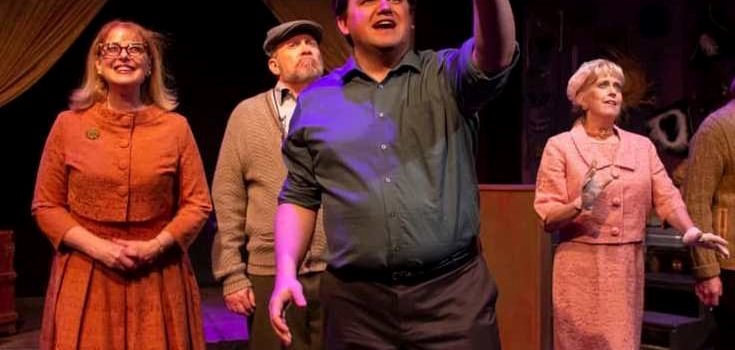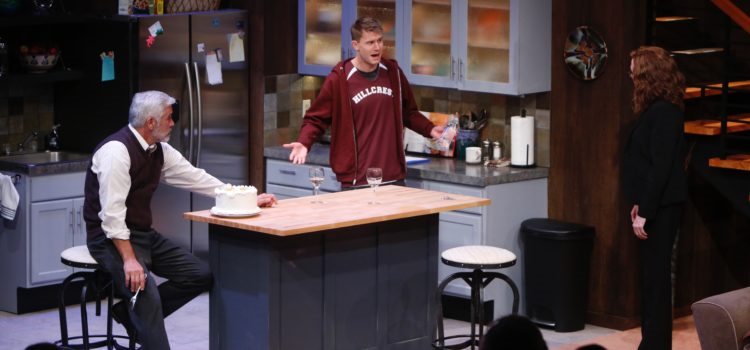By Lynn Venhaus
Managing Editor
Passion drives the characters and the R-S Theatrics production of a miraculous
little musical that has something to say. The title “A Man of No Importance” is
a misnomer, for Alfie Byrne is a remarkable human being whose significance is mirrored
in the faces of his fellow Dubliners.
In a blockbuster musical theater climate that regularly serves feel-good fluff and
spectacle, Broadway heavyweights Lynn Ahrens and Stephen Flaherty wrote pensive
Irish-inflected music and lyrics and four-time Tony-winning playwright Terrence
McNally penned the book for a heartfelt rumination on friendship, acceptance,
creative expression and social mores for a 2002 Lincoln Center production.
This unconventional off-Broadway diamond in the rough feels like a pot o’ gold
discovery today. McNally, whose bold work on gay themes has been heralded
worldwide, adapted the 1994 film “A Man of No Importance” starring Albert
Finney into an introspective work of substance, a fanfare for the common man with
wry humor and touching moments.
Unlike the grand ambition of their masterpiece “Ragtime,” McNally,
and Ahrens and Flaherty, through their songs, give meaning to modest people and
their small-scale dreams and desires. And it’s in a specific setting – a working-class
Dublin parish in 1964, with quaint characters, during a time of innocence as
the world is changing.
With grace and laser-focus, director Christina Rios has created a cozy setting
that feels like the earnest characters are in your living room, that they are
part of your daily life and live next door.
“A Man of No Importance” at R-S TheatricsThe snug space gives the top-flight cast an opportunity to
gel like a community – the way an amateur theater group does, how church parishes
do, and why co-workers, pub mates and newcomers connect. You feel their moods,
temperaments.
Good-natured Alfie Byrne (Mark Kelley) is a bus conductor
by day, with a poet’s soul, and a creative force at night. Inspired by his
mentor Oscar Wilde, he fervently directs the St. Imelda’s Players, coming alive
fired up by art.
While kind and outgoing, he is also forlorn, a square peg
trying to fit into a round hole, as Alfie is a closeted homosexual when it was
still a crime in Ireland.
At home, he lives with his surly sister Lily (Stephanie
Merritt), who finds his hobbies peculiar, particularly his penchant for making
foreign dishes for dinner distasteful – Bolognese sauce, curry? She has decided
not to marry until he does, which adds to her exasperation. Merritt’s strong vocal
prowess is displayed in “The Burden of Life” and the touching ‘Tell Me Why” in
second act.
Stephanie Merritt and Michael B. PerkinsHer blustery steady beau, Carney (Michael B. Perkins), is the neighborhood butcher. Quite a ham on stage, he leads his enthusiastic castmates in the upbeat “Going Up!” – a fun song any thespian can identify with, setting the stage for the rehearsals to come.
But in an ugly character development, Carney also thinks it
is his moral duty to make the local church aware they are putting on “pornography,”
for he is appalled at Alfie’s choice for the next production – Wilde’s controversial
“Salome,” based on the tragic Biblical characters.
Miffed that he’s not the lead, Carney riles up the ladies’
sodality while the rest of the troupe are trying to find a way to costume the
seven veils and paint a realistic dummy head of John the Baptist. He wraps his
thoughts around it in “Confusing Times.”
Perkins has several stand-out songs, including the dandy comical
duet with Merritt, expressing outrage about Alfie’s proclivities “Books.”
Perkins also doubles as the flamboyant Wilde in dream
sequences, handling both with aplomb.
While Father Kenny (Dustin Allison) is shutting down the program, the church
hall teems with cast members, and we are introduced to a quirky assortment of folks
in this interesting patchwork quilt of a show.
Alfie loves these people. They’re home. They’re his “other”
family.
Lindy Elliott as AdeleThere are the housewife diva-wannabes who flutter about him
– Miss Crowe (Kay Love), Mrs. Curtin (Nancy Nigh), Mrs. Grace (Jodi Stockton)
and Mrs. Patrick (Jennifer Theby-Quinn). Besides Carney, on the men’s side is
widowed Baldy (Kent Coffel), Rasher Flynn (Marshall Jennings) and Ernie Lally
(Dustin Allison).
All gifted singers, they are outstanding in the ensemble
numbers “A Man of No Importance,” “Our Father,” “Art” and several reprises. Nigh
has fun carrying out Naomi Walsby’s tap choreography in “First Rehearsal.”
Alfie has a secret crush on his co-worker, bus driver Robbie Fay (Kellen Green). He’d like to cast him as John the Baptist but Robbie’s not convinced. A lovely young woman, Adele Rice (Lindy Elliott), is new to town, and Alfie’s inspiration to tackle his mentor’s masterwork. Could she be his “Salome”?
Elliott, very impressive in this key role, sweetly sings a
reprise of “Love Who You Love,” and she and Kelley have a touching song
together, “Princess.”
Kellen Green as Robbie
As the handsome, conflicted Robbie, Green is terrific, trying
to find his way — and has a secret too. He robustly delivers “The Streets of
Dublin,” one of the show’s best numbers, and has a moving duet, “Confession” with
Kelley. He shows his prowess on the violin and in a reprise of “Love Who You
Love” as well.
Another highlight is Kent Coffel’s tender rendition of “The
Cuddles Mary Gave,” as the character Baldy mourns his late wife.
Anchoring the whole shebang is Mark Kelley, a revelation as
Alfie. He understands this sensitive soul and his pain. He imbues Alfie with so
much conviction that his bittersweet songs, “Love’s Never Lost” and “Love Who
You Love” are affecting and the triumph of “Welcome to the World” is
well-earned.
As the dialect coach, sound designer and fight
choreographer in addition to the lead, Kelley has galvanized this production.
The fight is realistic thanks to assistant fight choreographer Rhiannon Skye
Creighton and Perkins as fight captain.
The Irish accents are spot-on and never waiver – kudos to
the cast’s commitment on getting it right. It makes a difference setting the
proper tone, and the lived-in quality of the production is noteworthy.
Kent Coffel and Mark KelleyThe orchestra is very much a key part of the production,
and not just because conductor Curtis Moeller doubles as a character, Carson.
The cast interacts with them and vice versa, and they excel at giving an authentic
Celtic sound to the score. Moeller is on keyboard, with Benjamin Ash on bass,
Twinda Murry and Hanna Kroeger playing violins, Emily T. Lane on cello, Adam
Rugo on guitars and Marc Strathman on flutes. They achieve a lush sound that piquantly
flavors the show.
Amanda Brasher’s costume designs are a treat. She nailed the characters perfectly, from vintage frocks to the nubby knit sweaters to the assortment of hats defining personalities. Stockton’s Mrs. Grace wears a stunning ballet-slipper pink lace two-piece suit straight out of Jackie Kennedy’s closet.
The musical is a slow simmer but worth the investment as the sympathetic characters ripen. While the story spotlights a different time in another country, it illustrates the universal social awakening that “Love is Love is Love.” And being accepted for who you are is a worthy topic no matter when or where.
R-S Theatrics’ “A Man of No Importance” is to be admired
for its wholehearted mounting of a little-known show, illuminated by a talented
group of performers who feel like family at the finale.
Jodi StocktonR-S Theatrics presents “A Man of No Importance”
Fridays and Saturdays at 8 p.m. Sundays at 7 p.m., Aug. 9 – 25, at the Marcelle
Theatre, 3310 Samuel Shepard Drive in Grand Center For more information or for
tickets, visit www.r-stheatrics.com
or call 314-252-8812.

Lynn (Zipfel) Venhaus has had a continuous byline in St. Louis metro region publications since 1978. She writes features and news for Belleville News-Democrat and contributes to St. Louis magazine and other publications.
She is a Rotten Tomatoes-approved film critic, currently reviews films for Webster-Kirkwood Times and KTRS Radio, covers entertainment for PopLifeSTL.com and co-hosts podcast PopLifeSTL.com…Presents.
She is a member of Critics Choice Association, where she serves on the women’s and marketing committees; Alliance of Women Film Journalists; and on the board of the St. Louis Film Critics Association. She is a founding and board member of the St. Louis Theater Circle.
She is retired from teaching journalism/media as an adjunct college instructor.


